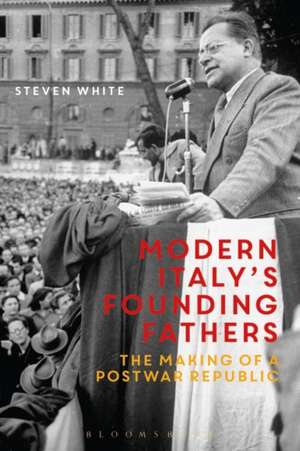Modern Italy's Founding Fathers: The Making of a Postwar Republic
Autor Dr Steven F. Whiteen Limba Engleză Hardback – 24 iun 2020
| Toate formatele și edițiile | Preț | Express |
|---|---|---|
| Paperback (1) | 198.47 lei 6-8 săpt. | |
| Bloomsbury Publishing – 29 iun 2022 | 198.47 lei 6-8 săpt. | |
| Hardback (1) | 599.25 lei 3-5 săpt. | |
| Bloomsbury Publishing – 24 iun 2020 | 599.25 lei 3-5 săpt. |
Preț: 599.25 lei
Preț vechi: 859.07 lei
-30% Nou
Puncte Express: 899
Preț estimativ în valută:
114.70€ • 124.63$ • 96.41£
114.70€ • 124.63$ • 96.41£
Carte disponibilă
Livrare economică 01-15 aprilie
Preluare comenzi: 021 569.72.76
Specificații
ISBN-13: 9781474215497
ISBN-10: 1474215491
Pagini: 272
Ilustrații: 15 bw illus
Dimensiuni: 156 x 234 x 22 mm
Greutate: 0.57 kg
Editura: Bloomsbury Publishing
Colecția Bloomsbury Academic
Locul publicării:London, United Kingdom
ISBN-10: 1474215491
Pagini: 272
Ilustrații: 15 bw illus
Dimensiuni: 156 x 234 x 22 mm
Greutate: 0.57 kg
Editura: Bloomsbury Publishing
Colecția Bloomsbury Academic
Locul publicării:London, United Kingdom
Caracteristici
Makes use of a range of archival sources and includes a useful timeline, as well as numerous illustrations
Notă biografică
Steven F. White is an independent historian. The recipient of two Fulbright awards and a research fellowship at European University Institute, he has taught at the University of Virginia, Averett University, the University of Perugia, Mount St. Mary's University and the U.S. State Department's Foreign Service Institute. He has published widely on modern Italian history, including Progressive Renaissance: America and the Reconstruction of Italian Education, 1943-1962 (1991).
Cuprins
List of IllustrationsAcknowledgementsIntroduction1. Three Founding Fathers2. A Daunting Project3. From Resistance to Restoration4. Monarchy or Republic?5. The Constitution and the Peace Treaty6. Toward April 18, 19487. Cold War Stasis, 1948 - 19548. AftermathAppendix: Chronology of EventsBibliographyIndex
Recenzii
Modern Italy's Founding Fathers reads the rebirth of Italian Democracy through the three major figures acting in the postwar rebuilding: De Gasperi, Nenni, and Togliatti. In doing so, White investigates this melting pot of a political system with a comprehensive and detailed interpretation that goes beyond the old ideological approaches of partisan historiography.
Steven F. White offers a valuable new contribution to the scholarship on Modern Italy by refocusing attention on individual historical actors in shaping the course of events. His book, in particular, illuminates the decisive role played by a trio of ideologically diverse political leaders in guiding their country during the extremely difficult transition from Fascist dictatorship, military defeat, and insipient civil war to Italy's current democratic republic in the first years after World War II.
In an unusual "group biography," Steven F. White analyzes the thinking and compromises of three ideological antagonists who fashioned Italy into a democratic republic following twenty years of Fascist dictatorship and wartime defeat. A detailed description of Italian postwar development, White's book will appeal to academics and students unfamiliar with this period in the country's history.
More than a collective biography of the Italian Republic's key figures, White's book illuminates the political friendships, and rivalries, that shaped the recreation of democracy in this formerly Fascist country. Deftly balancing the interplay between individual choices and larger historical forces, White's portrayal of the Republic's early years as a personal-political drama will captivate students and specialists alike.
Steven F. White offers a valuable new contribution to the scholarship on Modern Italy by refocusing attention on individual historical actors in shaping the course of events. His book, in particular, illuminates the decisive role played by a trio of ideologically diverse political leaders in guiding their country during the extremely difficult transition from Fascist dictatorship, military defeat, and insipient civil war to Italy's current democratic republic in the first years after World War II.
In an unusual "group biography," Steven F. White analyzes the thinking and compromises of three ideological antagonists who fashioned Italy into a democratic republic following twenty years of Fascist dictatorship and wartime defeat. A detailed description of Italian postwar development, White's book will appeal to academics and students unfamiliar with this period in the country's history.
More than a collective biography of the Italian Republic's key figures, White's book illuminates the political friendships, and rivalries, that shaped the recreation of democracy in this formerly Fascist country. Deftly balancing the interplay between individual choices and larger historical forces, White's portrayal of the Republic's early years as a personal-political drama will captivate students and specialists alike.
